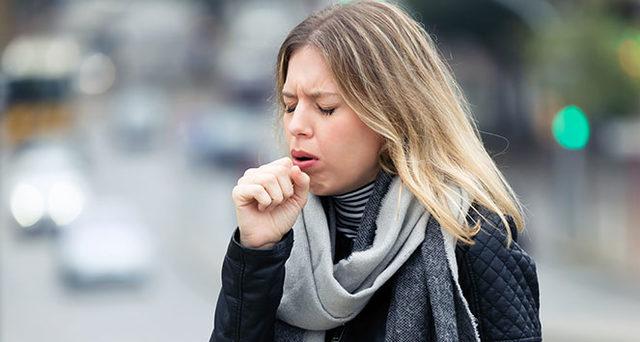Chest Diseases Specialist Prof. Dr. Sami Öztürk made statements about cough. Explaining what causes cough, Prof. Dr. Öztürk said, “Cough is a reactionary movement of the respiratory system, that is, the lungs, to protect our body as a defense mechanism. “Cough occurs to protect our body with the cough mechanism against infections, chemicals, odors, dust and allergens, and sometimes cough occurs due to diseases of some organs in our body,” he said.
“A COUGH THAT LASTS EXCEEDING 3 WEEKS SHOULD BE EXAMINED”
Prof. stated that cough can be risky no matter how many weeks it lasts. Dr. Öztürk said, “Coughs can generally last up to 3 weeks in normal infections. “Coughs that last more than 3 weeks, reach 8 weeks, or even exceed this period should be considered dangerous and should be examined in detail,” he said.
“PROLONGED COUGH MAY BE OBSERVED AFTER FLU AND COLD”
Pointing out that a long-lasting cough may be a sign of some diseases, Prof. Dr. Öztürk said, “Coughs lasting longer than 8 weeks can be a symptom of many important diseases. Among these diseases; There are many reasons such as allergies, sinusitis, reflux, asthma, COPD, bronchiectasis, tuberculosis, lung cancer, heart failure, and some blood pressure medications that cause cough. One of the most important causes of prolonged cough that is overlooked by society is prolonged cough after flu or cold. “After the cold symptoms disappear in 1 week, a dry cough remains for about 3-4 weeks,” he said.

“BEWARE OF SEASONAL ALLERGIC COUGH AND COVID COUGH”
Talking about how the symptoms of seasonal allergic cough and Covid cough can be distinguished, Prof. Dr. Öztürk said, “The main symptoms of seasonal allergic cough are frequent sneezing, nasal congestion, runny nose, itching, postnasal drip, watery and red eyes and mild cough. While high fever, intense cough, muscle and joint pain, headache, sore throat and extreme weakness are observed in Covid disease, these findings are not seen in allergic cough. “These findings are always more severe in Covid,” he said.

“ENVIRONMENTAL FACTORS MAY AFFECT”
Stating that environmental factors increase cough, Prof. Dr. Öztürk said, “Recently, as a result of the increase in chemical pollution in the air in big cities and industrial zones, the use of poor quality heating fuels for economic reasons and the unhealthy gases and wastes released into the air by public transportation vehicles, there has been an increase in respiratory system diseases such as asthma and COPD. “These diseases also cause chronic cough,” he said.

“POLLEN TRIGGERS ALLERGIC COUGH”
Stating that some situations trigger allergic cough, Prof. Dr. Öztürk said, “Pollens, house dust mites, fungal spores, and pets can cause allergic cough in sensitive people. “Allergic cough can be prevented by doing allergy tests and avoiding allergens,” he said.

“THE NUMBER OF PEOPLE COUGHING IS ALARMING”
Prof. emphasized that the number of people coughing in society has increased recently. Dr. Öztürk said, “The number of people coughing has been increasing in recent years due to the increase in the number of smokers, the increase in air pollution, the increase in chemicals polluting the air in industrial areas, and the pollution of breathing air by poor quality heating fuels.”
“ALLERGENS SHOULD BE AVOIDED IN SEASONAL Cough”
Explaining how cough can be relieved, Prof. Dr. Öztürk shared the following information:
“Cough can be easily relieved by first treating the factors or diseases that cause cough. If the cough is caused by infection, the cough is cured by treating the infection, and if the cough is due to allergens, the cough is cured by staying away from allergens. Avoidance of allergens is the first form of treatment for seasonal allergic cough. Depending on the symptoms of the disease, medications called antihistamines and some steroid allergy medications are used during the allergen season under the supervision of a doctor to reduce nasal congestion, runny nose, sneezing and postnasal drip. “In Covid, since the cough is caused by viruses, the disease is treated with antiviral drug treatments.”
“OXYGEN AND INHALER TREATMENT CAN BE APPLIED”
Explaining when an individual should receive treatments such as oxygen or inhaler, Prof. Dr. Öztürk said, “If the patient has asthma or COPD due to cough and the disease symptoms of cough, shortness of breath, wheezing and feeling of pressure in the chest are intense, inhaler drugs should be used in these patients. If the blood oxygen level falls below a certain value, oxygen therapy can also be applied to these patients. “If the patient has shortness of breath, the doctor will apply the appropriate treatment to the patient,” he said.
“HOT HERBAL TEA CAN BE GOOD FOR COUGH”
Pointing out that coughing can be reduced by consuming plenty of fluids and keeping the throat moist. Dr. Öztürk said, “Apart from plenty of water, hot herbal teas such as ginger, turmeric, linden and marshmallow root can also soothe the cough. “Consuming honey and gargling with warm salt water can also help relieve cough,” he said.
“MEDICTION MAY NOT BE USEFUL IN EVERY COUGH”
Underlining that cough medicine should not be used for every cough, Prof. Dr. Öztürk said:
“The use of cough suppressants in lung diseases with phlegmy cough may cause delayed healing of the infection. “Cough syrups that dissolve and remove phlegm can be given to patients who have phlegm but cannot expectorate it during the illness.”
“COUGH MAY GIVE UP BY ITSELF”
Prof. noted that cough is generally temporary and resolves spontaneously. Dr. Öztürk said, “In simple infections that occur not due to a specific and serious disease, the cough goes away on its own within days. He concluded his words by saying, “However, coughs that occur due to a chronic disease do not go away without treatment.” (UAV)

